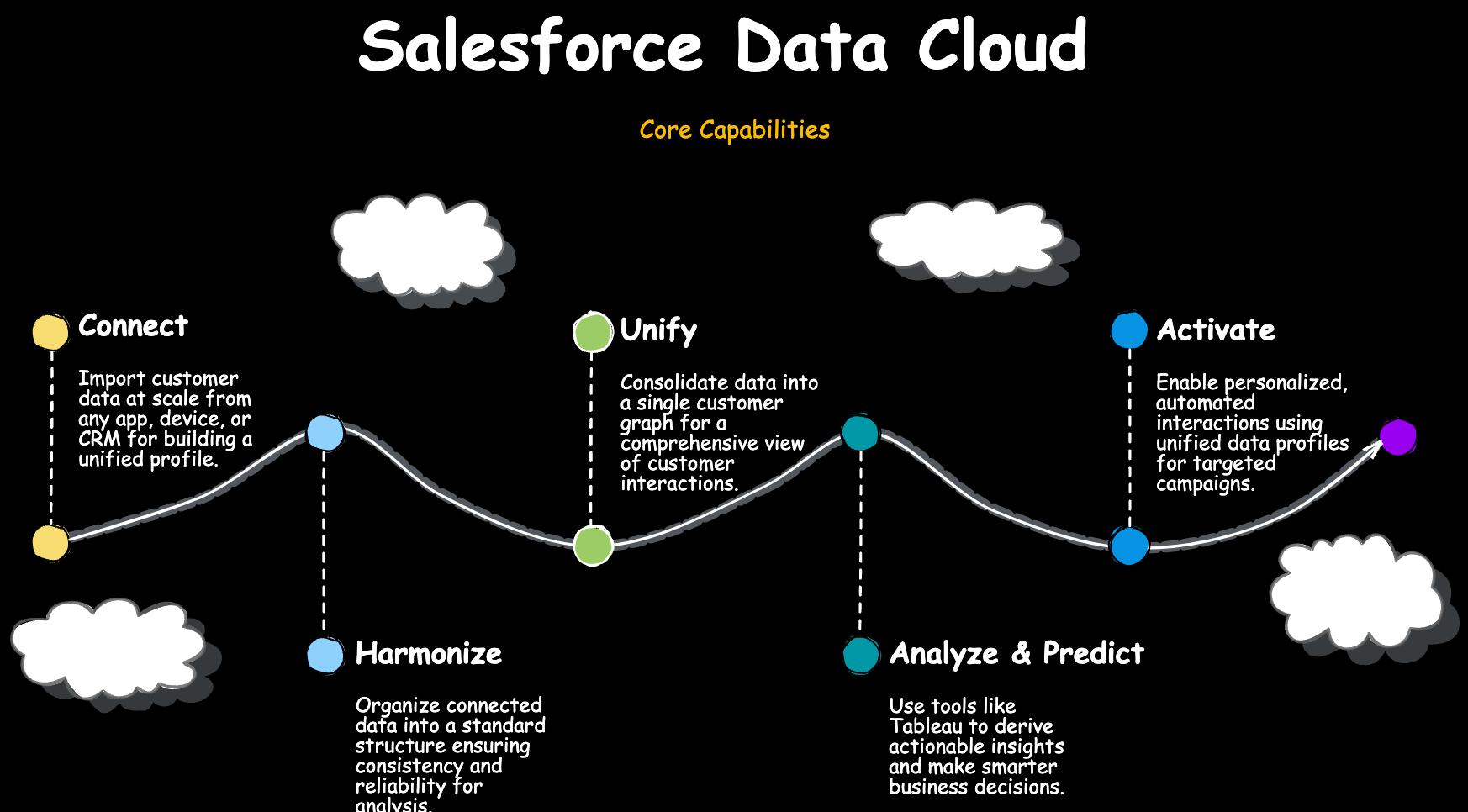In today’s data-driven world, businesses are drowning in information. Data is siloed across various systems, making it difficult to gain a unified view of the customer. This is where Salesforce Data Cloud comes in, offering a solution to connect, unify, and activate your data for better business outcomes.
What Is Salesforce Data Cloud?
Salesforce Data Cloud is a platform that allows you to connect and unify your customer data from various sources, creating a single, 360-degree view of each customer. This unified data can then be used to drive insights, power automation, and enable trusted AI.
According to Marc Benioff, “Data is the foundation for every AI Transformation.” Data Cloud is designed to be the foundation for this transformation, helping businesses to organize and leverage their data effectively.
Data Cloud Offers Several Key Capabilities
At the heart of Salesforce Data Cloud are five core capabilities, designed to simplify data management and create value across the customer lifecycle:
Connect
Import customer data at scale from any app, device, CRM, or real-time stream using out-of-the-box connectors and APIs. This data forms the foundation for building a unified profile.
Harmonize
Organize connected data into a standard structure using Salesforce Customer 360. Harmonization ensures data consistency and compatibility, creating a clean, reliable dataset for analysis.
Unify
Consolidate harmonized data into a single customer graph, giving businesses a comprehensive, 360-degree view of their customers.
Analyze & Predict
Use tools like Tableau or AI-powered models to gain actionable insights from unified customer data. These insights enable businesses to make smarter decisions, from predicting churn to identifying upsell opportunities.
Activate
Enable personalized, automated interactions using unified data profiles. Businesses can deliver targeted campaigns, real-time recommendations, and dynamic workflows across channels.
Use Cases for Data Cloud
Salesforce Data Cloud solves several business challenges by enabling better customer engagement, efficient operations, and data-driven automation. Here are some common use cases:
- Improving Customer Understanding: Gain a 360-degree view of customer interactions and preferences across touchpoints.
- Enhancing Sales: Unlock upsell and cross-sell opportunities by leveraging unified customer profiles.
- Personalizing Marketing: Refresh content and offers in real time to deliver personalized marketing experiences.
- Optimizing Service: Provide proactive and personalized service by unifying customer data.
- Streamlining Data Management: Simplify data integration and avoid building complex pipelines.
- Data-Driven Automation: Automate workflows using triggers from unified data.
The Power of Real-Time Data
Salesforce Data Cloud doesn’t just unify historical data—it processes and activates real-time customer data streams, ensuring that businesses can adapt to customer needs dynamically. For instance, a retail brand can identify when a customer abandons their online shopping cart and trigger an automated email or personalized discount offer immediately.
One of Data Cloud’s most powerful features is its ability to ground AI in trusted data. AI tools like Agentforce leverage harmonized data to provide actionable insights, personalized recommendations, and automated actions—all based on verified, unified information.
Ground AI in Trusted Data with Agentforce
A standout capability of Salesforce Data Cloud is its ability to ground AI tools like Agentforce in harmonized, trusted data. By providing AI with verified datasets, businesses can improve the accuracy and reliability of predictions and recommendations. Here’s how Data Cloud and Agentforce work together:
Deliver Accurate Insights
Agentforce analyzes customer data streams in real time, powered by harmonized data from Data Cloud. This reduces errors in AI predictions, enabling more precise targeting and forecasting.
Enable Real-Time Personalization
With unified customer profiles, Agentforce generates intelligent, personalized actions based on current behavior. For instance, an e-commerce platform can recommend products to customers based on their browsing history and preferences.
Automate and Enhance Efficiency
Agentforce leverages trusted data to automate tasks like lead scoring, service ticket prioritization, and campaign optimization, helping teams focus on high-value activities.
Data Cloud Provisioning: Permissions and Enablement
Provisioning Data Cloud involves setting up the environment, users, and permissions needed to get started. This process includes deciding whether to deploy Data Cloud in a standalone org or an existing org. Once this decision is made, the following steps are crucial for enablement:
1. Update Admin User
The first step is to add the Data Cloud Admin or Data Cloud Marketing Admin permission set to a System Administrator. This grants the necessary administrative privileges to configure Data Cloud.
2. Provision the Data Cloud App
Navigate to Setup → Data Cloud → Get Started to provision the app and enable it for your organization.
3. Create Profiles
Create user profiles for Data Cloud by cloning the standard Identity User profile. Assign Data Cloud as the default app under Custom App Settings.
4. Add Users and Permission Sets
Assign appropriate permission sets to users based on their roles:
- Data Cloud Admin: Full access to all features and functionality.
- Data Cloud for Marketing Admin: Similar to the Admin permission set, but focuses on segmentation and activation.
- Data Cloud for Marketing Specialist: Create and manage customer segments.
- Data Cloud for Marketing Manager: Manage overall segmentation strategy, including creating activation targets and activations.
- Data Cloud for Data Aware Specialist: Map data to models, configure identity resolution, and create data streams.
- Data Cloud User: View Data Cloud features and work with mapped data streams, identity resolution rulesets, and calculated insights.
Why Choose Salesforce Data Cloud?
Salesforce Data Cloud stands out as a comprehensive customer data platform, offering businesses the ability to:
- Consolidate and unify customer data from multiple sources.
- Activate insights in real time for meaningful customer interactions.
- Ground AI tools like Agentforce in verified, harmonized data for better accuracy.
Conclusion
Salesforce Data Cloud is a powerful tool for businesses looking to make the most of their data. By connecting, unifying, and activating data from across your organization, you can gain a holistic view of your customers and use that to drive business success. With its flexible architecture and robust features, Data Cloud is a key component of any modern data strategy.
#SalesforceDataCloud #CustomerDataPlatform #Agentforce #SalesforceAI #RealTimeData #Customer360 #SalesforceInnovation #DataDrivenBusiness #PersonalizedCustomerExperience #TrustedAI #AutomationWithAI
